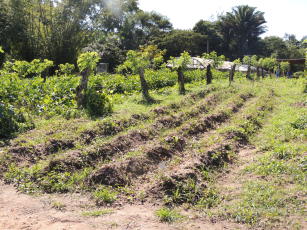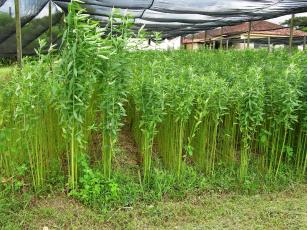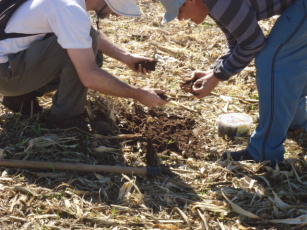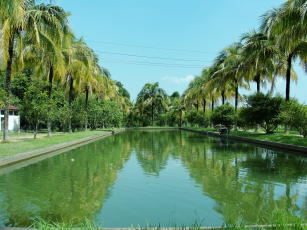Technological solutions to optimize the use of waste and biomass as a soil fertility input in organic production systems
Technological solutions to optimize the use of waste and biomass as a soil fertility input in organic production systems

Photo: FERREIRA, A. L.
One of the bottlenecks for the expansion of organic agriculture is the lack of nitrogen. A system that annually exports large amount of such nutrient with product harvests needs a continuous supply of the element to keep the system productive. However, organic production in Brazil cannot use nitrogen from synthetic sources, according to Law 10831, from 2003. Thus, green manure with the use of atmospheric nitrogen fixing legumes is a strategy for organic farmers.
However, generally speaking, this technique has not been enough, as family units normally have small territories to work with, which hinders compatibility between green manure species and cash crops in terms of time and space. In order to meet their nitrogen requirement, farmers thus often use agroforestry and livestock waste. Despite most of such waste offering about 3% of nitrogen, which is suitable for organic use as fertilizers, there is a large variation in this percentage, in addition to problems related to chemical and biological contaminants.
This lack of standardization limits trade and increases uncertainty with regard to the results of the use of such products. Hence, one of the most popular types of waste is castor meal, which presents at least 5% nitrogen. However, in this in case, the limiting factor is the cost, about 400% higher in terms of the N-Urea ratio.
In light of the difficulty organic farmers have in nutrient supplementation, this project studied the supply of standardized organic inputs, with physical, chemical and biological quality and viable prices for use in organic agriculture in Brazil. The intention was to develop and adapt technologies, products, practices and processes within a multidisciplinary network to rationally explore agroforestry and livestock waste and biomass, aiming at the expansion of Brazilian organic agriculture.
The project mapped the waste available in Brazil, which can be assessed so that the types that have greater potential to be used as organic fertilizers are characterized. The characterized material can become raw material for the development of standardized organic inputs, such as organic fertilizers, organic-mineral fertilizers, biofertilizers, and compounds. The studies also evaluated the impacts of the use of such inputs in the soil-plant-atmosphere system, including biological indicators and greenhouse gases.
However, generally speaking, this technique has not been enough, as family units normally have small territories to work with, which hinders compatibility between green manure species and cash crops in terms of time and space. In order to meet their nitrogen requirement, farmers thus often use agroforestry and livestock waste. Despite most of such waste offering about 3% of nitrogen, which is suitable for organic use as fertilizers, there is a large variation in this percentage, in addition to problems related to chemical and biological contaminants.
This lack of standardization limits trade and increases uncertainty with regard to the results of the use of such products. Hence, one of the most popular types of waste is castor meal, which presents at least 5% nitrogen. However, in this in case, the limiting factor is the cost, about 400% higher in terms of the N-Urea ratio.
In light of the difficulty organic farmers have in nutrient supplementation, this project studied the supply of standardized organic inputs, with physical, chemical and biological quality and viable prices for use in organic agriculture in Brazil. The intention was to develop and adapt technologies, products, practices and processes within a multidisciplinary network to rationally explore agroforestry and livestock waste and biomass, aiming at the expansion of Brazilian organic agriculture.
The project mapped the waste available in Brazil, which can be assessed so that the types that have greater potential to be used as organic fertilizers are characterized. The characterized material can become raw material for the development of standardized organic inputs, such as organic fertilizers, organic-mineral fertilizers, biofertilizers, and compounds. The studies also evaluated the impacts of the use of such inputs in the soil-plant-atmosphere system, including biological indicators and greenhouse gases.
Status: Completed Start date: Tue Jan 01 00:00:00 GMT-03:00 2019 Conclusion date: Tue Jan 31 00:00:00 GMT-03:00 2023
Head Unit: Embrapa Agrobiology
Project leader: Ednaldo da Silva Araujo
Contact: ednaldo.araujo@embrapa.br



